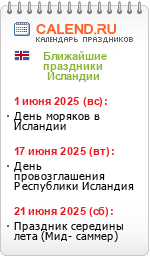Последние темы
Похожие темы
Праздники Исландии

Вход
Strength of Icelandic krona unknown
Страница 1 из 1
 Strength of Icelandic krona unknown
Strength of Icelandic krona unknown
It is difficult to say with any certainty by how much the Icelandic krona will depreciate in value, if at all, when it is re-floated, according to Gylfi Zoega, head of the economics department at the University of Iceland. It is likely the currency will be floated before the New Year.
Iceland’s application for an approximate USD 2 billion loan from the International Monetary Fund can expect a final decision over the next few days, the Icelandic Prime Minister, Geir H. Haarde said in a press conference on Monday. In addition, the country also has hopes of securing a further USD 3 billion in loans from other countries. A USD 800 million portion of the IMF loan will be available within 10 days, if the loan is approved.
Gylfi Zoega believes that Iceland needs to do more than just re-float the krona. The government will also have to tackle money matters and government finances, he says.
“The Central Bank’s euro exchange rate is determined by daily auctions at the moment. Therefore, the official exchange rate is higher than where the krona is being bought and sold abroad. The euro now costs about ISK 210 abroad, but ISK 172 through the Central Bank of Iceland. That is to say, if those concerned get permission to buy currency. When the krona has been re-floated there will only be one market rate of exchange, meaning importers can get currency and exporters can bring the money they make into Iceland again.”
When the krona is floated again, its true market value will come to light, whether that is lower or higher than the current Central Bank rate. It will be important that the right price is found on the market with as little Central Bank intervention as possible – that is to say that foreign currency reserves should not be used, and that the country should use means to reduce the difficulties of private companies other than squandering its reserves to support short term unrealistic currency exchange rates.
Gylfi Magnusson, associate professor of economics at the University of Iceland says that claims which have been made on how to best exploit borrowed capital are still somewhat unclear and depend largely on what the Central Bank does in the event of too great a change in the value of the krona. The worst outcome would be for the Central Bank to use up its borrowed foreign capital in trying to defend an unrealistically high exchange rate. “That way, the capital could run out very quickly,” Magnusson says.
The Bank’s use of the capital with the aim of rebuilding trust in the Icelandic economy would be positive, and make the loans less expensive in the long run.
Olafur Isleifsson, economics lecturer at Reykjavik University believes, however, that the government should place restrictions on the exchange market, at least to begin with.
Some portion of the money should be used to pay off several complicated ongoing issues. Especially to address the severe need for foreign currency on the market.
Two currency markets have been running here, one being the daily Central Bank auctions and the other one outside the country. “That market can give the best picture of what the minimum exchange rate might be, the way things stand at the moment.”
A different perspective: Lilja Mosesdottir, doctor of economics says that the krona appears not to enjoy any trust abroad. Foreign banks flinch, for example, when asked to deal with Icelandic credit cards. Therefore: “I believe this loan must be used to maintain today’s rates,” she says.
(From MBL.is)
Iceland’s application for an approximate USD 2 billion loan from the International Monetary Fund can expect a final decision over the next few days, the Icelandic Prime Minister, Geir H. Haarde said in a press conference on Monday. In addition, the country also has hopes of securing a further USD 3 billion in loans from other countries. A USD 800 million portion of the IMF loan will be available within 10 days, if the loan is approved.
Gylfi Zoega believes that Iceland needs to do more than just re-float the krona. The government will also have to tackle money matters and government finances, he says.
“The Central Bank’s euro exchange rate is determined by daily auctions at the moment. Therefore, the official exchange rate is higher than where the krona is being bought and sold abroad. The euro now costs about ISK 210 abroad, but ISK 172 through the Central Bank of Iceland. That is to say, if those concerned get permission to buy currency. When the krona has been re-floated there will only be one market rate of exchange, meaning importers can get currency and exporters can bring the money they make into Iceland again.”
When the krona is floated again, its true market value will come to light, whether that is lower or higher than the current Central Bank rate. It will be important that the right price is found on the market with as little Central Bank intervention as possible – that is to say that foreign currency reserves should not be used, and that the country should use means to reduce the difficulties of private companies other than squandering its reserves to support short term unrealistic currency exchange rates.
Gylfi Magnusson, associate professor of economics at the University of Iceland says that claims which have been made on how to best exploit borrowed capital are still somewhat unclear and depend largely on what the Central Bank does in the event of too great a change in the value of the krona. The worst outcome would be for the Central Bank to use up its borrowed foreign capital in trying to defend an unrealistically high exchange rate. “That way, the capital could run out very quickly,” Magnusson says.
The Bank’s use of the capital with the aim of rebuilding trust in the Icelandic economy would be positive, and make the loans less expensive in the long run.
Olafur Isleifsson, economics lecturer at Reykjavik University believes, however, that the government should place restrictions on the exchange market, at least to begin with.
Some portion of the money should be used to pay off several complicated ongoing issues. Especially to address the severe need for foreign currency on the market.
Two currency markets have been running here, one being the daily Central Bank auctions and the other one outside the country. “That market can give the best picture of what the minimum exchange rate might be, the way things stand at the moment.”
A different perspective: Lilja Mosesdottir, doctor of economics says that the krona appears not to enjoy any trust abroad. Foreign banks flinch, for example, when asked to deal with Icelandic credit cards. Therefore: “I believe this loan must be used to maintain today’s rates,” she says.
(From MBL.is)
_________________
ООО "АйсКорпо Рус" www.icecorpo.is
Школа русского языка в Исландии www.modurmal.com
 Похожие темы
Похожие темы» Another bad day for Icelandic krona
» Icelandic ministers kept in the dark?
» New operas at the Icelandic Opera
» Icelandic ministers kept in the dark?
» New operas at the Icelandic Opera
Страница 1 из 1
Права доступа к этому форуму:
Вы не можете отвечать на сообщения


» FAQ или часто задаваемые вопросы
» Шторм на Ладоге
» У моря в апреле
» Ты будешь жить
» 67-я параллель
» Тиманский овраг
» Отель "Ореанда"
» Карельские рассветы
» Альма-Матер